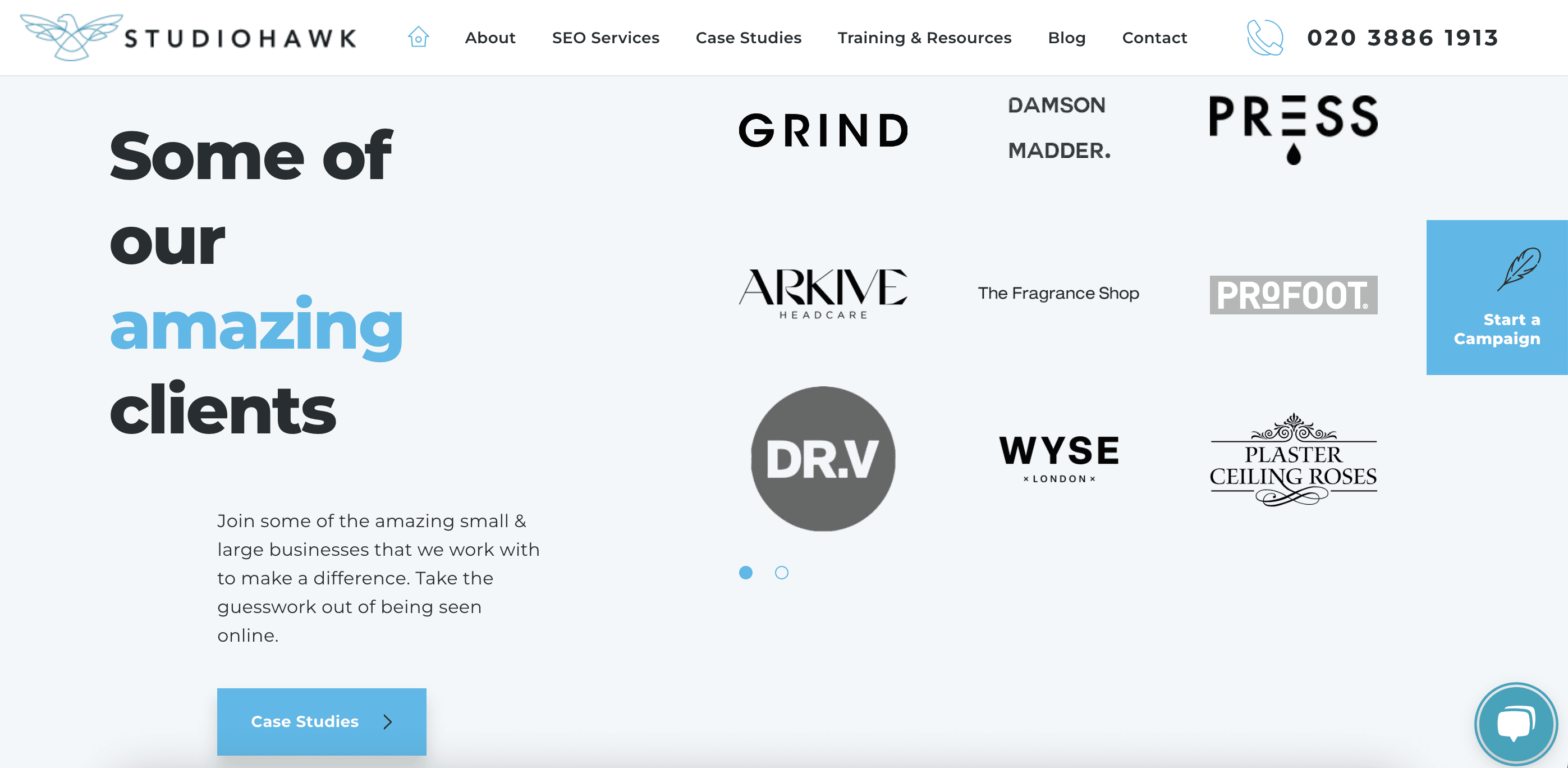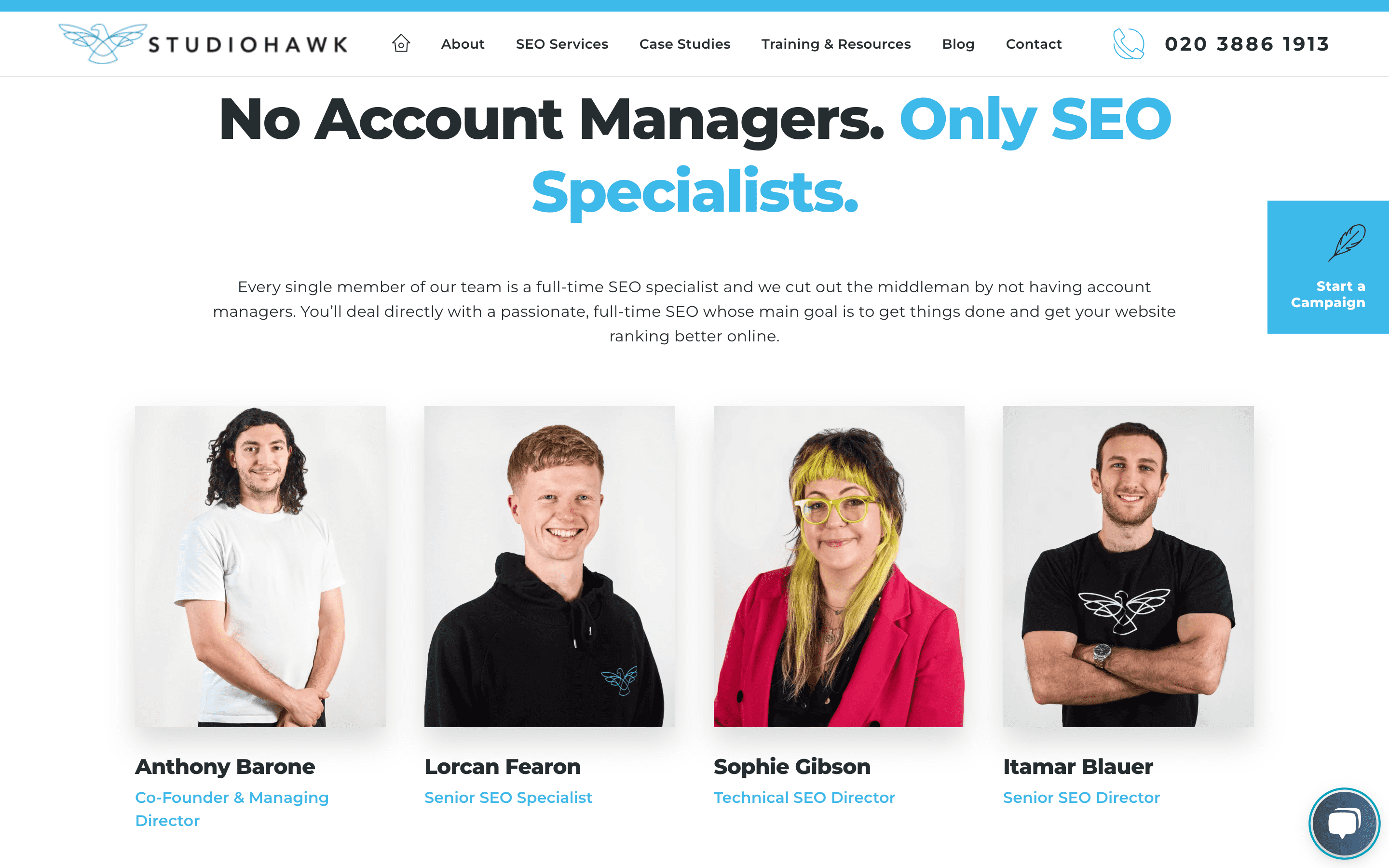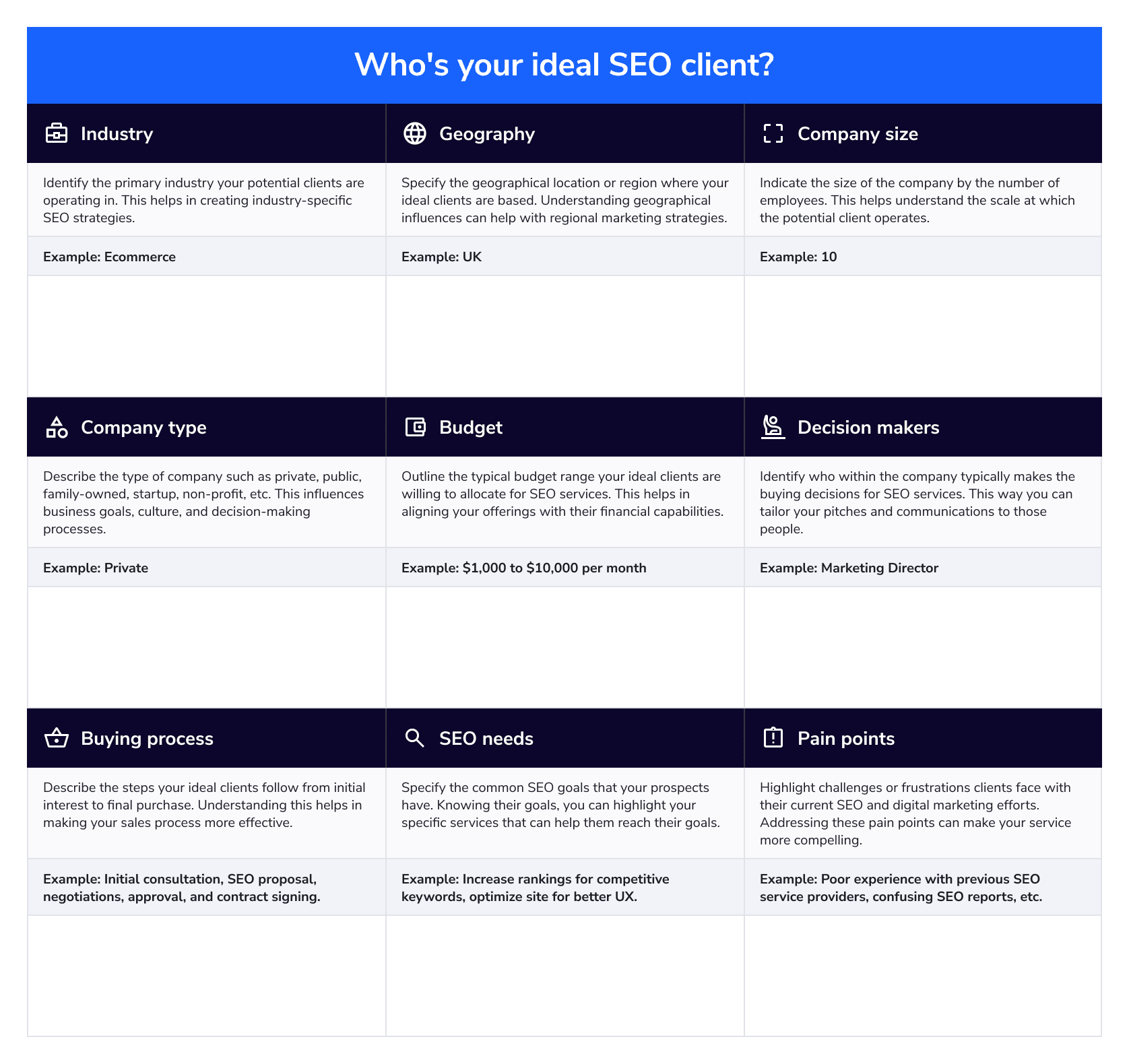Starting an SEO agency: Hard-Won Secrets for Success
-
Define your niche
Offering basic SEO services is no longer enough to stand out. Identify a specific niche to specialize in and target.
-
Get out and network
Build your network through events, meetups, and communities. Exchange experiences and generate leads.
-
Form strategic partnerships
Look for and collaborate with companies offering complementary services for mutually beneficial relationships.
-
Deliver high-quality work
Set a high bar and continuously raise it to build an excellent reputation.
-
Never stop learning
Keep expanding your SEO expertise, learn from experts, and stay ahead of changes and trends.
As co-founder and managing director of the SEO agency StudioHawk (from the UK), my SEO journey has been quite unconventional. I began with a degree in sports management and spent several years working in a pub—not exactly the digital marketing sphere. When a friend told me about SEO, everything changed. My growing interest in the industry led me to StudioHawk agency in Australia, and later, to expanding its presence into one of the world’s most competitive markets: the UK.
In this article, I’ll share some major tips for starting an SEO agency and some pitfalls to watch out for, all based on my personal experiences.
The first steps to starting an SEO company
Starting an SEO agency involves more than just understanding SEO. It’s also about understanding the market, defining competitors (and how you differ), and building partnerships. These were the first steps I took when launching StudioHawk UK, and I believe everyone should apply them when setting up an SEO business.
Network to build a client base and partnerships
Start your SEO agency with networking. Become more active in the community and build relationships to find your first few clients. Join networking groups, attend business meetups and events, and start booking introductory calls with potential prospects.
The goal is to get “face-to-face” with as many people who need your SEO services as possible. This is how you generate awareness, make new connections, craft tailored SEO proposals, and secure your first clients. You can then write case studies about how you helped your clients achieve their desired results.

Landing one or two smaller clients in those first few months gives you the experience you need. It also gives you social proof. You can ask them for referrals and get introductions to other potential clients from their network.
Use this step to locate complementary service providers as well. Partnering with someone who offers web development, social media marketing, and other services could enhance the value you provide.
Define competitors
Research major players in your market, including competing agencies and potential partners.
Since the SEO field’s barrier to entry is relatively low, you’ll likely find a mix of large agencies and smaller firms. Identify the ones you can emulate. Note their operations, capabilities, client portfolios, and how they position themselves.
You should also analyze the market you’re entering. When we expanded StudioHawk to the UK, we found ourselves entering one of the most competitive and knowledgeable markets. Our competition wasn’t just limited to other agencies. The UK has many reputable brands and highly capable in-house teams, so you need to truly know your stuff and prove your expertise if you want to speak with or win the business of bigger companies.
To stand out in a competitive landscape like SEO, you have to brush up on your field, your goal, and the value you bring, and devise a standout SEO strategy that resonates with your client’s business goals.
Differentiate your agency
With so many players already established in the industry, you need something they don’t offer (unique value proposition) and a brand voice to communicate it properly. Ideally, you want to stand out from the crowd.
StudioHawk initially set itself apart by having SEO specialists who work directly with clients, skipping the traditional account manager middleman. This ensured clients received expertise straight from the source.

Beyond operational distinctions like this, look for other ways to be different. For example:
- Specialization: Don’t position yourself as a generalist agency. Instead, focus on a specific niche like ecommerce SEO, local SEO, SaaS SEO, etc.
- Proprietary process: Develop a unique methodology for your campaigns that no other agency offers.
- Added value: Bundle additional services like CRO, PPC, and web development under one roof. Others may not provide this service.
There are many opportunities to differentiate your agency based on its unique strengths and philosophies. In StudioHawk’s case, we capitalized on our proven track record from Australia and embraced the Aussie way of doing things.
Use any assets and value-added services that set your agency apart.
Map out your ideal client
Deciding who to target as your core client base is vital because you can’t target everyone. This may be difficult in the initial stages when you have limited expertise or resources.

Here is why StudioHawk made the strategic decision to focus on the small-to-medium enterprise (SME) market (when launching in the UK):
- SMEs generally have smaller budgets. We responded by offering competitive prices and lower overhead costs.
- Many SMEs suffer from poor experiences. This inspired us to create quality services in a field filled with low-quality SEO providers who use churn and burn tactics.
- Smaller businesses crave more personalized service. This calls for tighter client bonds.
To impress SMEs, we kept things simple and transparent. We focused on clearly communicating our services and how they connect to the client’s business goals and revenue targets.
SEO is often sold as simple traffic acquisition. SEO agencies rarely tie their traffic acquisition strategies to tangible business impact. Understanding the client’s objectives and building your strategy around them gives you a strategic advantage so you can hit those targets.
Taking a business-first approach and aligning your goals with the client’s definition of success sets the groundwork for loyal and long-term partnerships.
Build a team for your agency
Only a devoted and talented team can deliver the best service and results to your clients. Make sure to hire and train employees while building an effective system for them to grow and learn in.
Hiring and training new talents
When building your SEO team for your agency, prioritize candidates who align with your company culture and match your core values. Don’t just focus on technical skills. While having expertise in SEO is important, this skill can be developed through training. It’s much harder to train employees to have the right mindset and attitude.
Take the time to learn the candidate’s energy and soft qualities during the SEO interview process. If they mesh with your agency’s philosophy and vibe, integrating them into your team will be easier.
Create a comprehensive training process for new hires. Involve junior team members in client, lead, and report calls from day one to help them understand your processes and communication styles.
Use Mr. Miyagi’s teaching style. Assign new hires practical, simple and repetitive tasks. This approach helps new employees learn through experience. Eventually, you can throw them into the deep end, but not without “lifeboats.” This means assigning more complex tasks to new hires but providing them with ample support.
In the first 6-12 months, prioritize nurturing and developing a solid foundation for your team. After that, you can gradually increase their responsibilities. Once they grasp the fundamentals of their work, your new team members will be more independent.
Developing clear frameworks
Provide hands-on training and establish clear systems and frameworks for your team. People need to be told what to do. They need you to tell them what their job is, how to do it, and why they are doing it. Lack of structure leads to inconsistency, low-value work, and misalignment with client expectations.
Develop clear job descriptions with set responsibilities, metrics, and expected outputs for each role. Your overall order of operations can be as loose or as hardline as you want, but you must create a guidebook, rules, and criteria around it. Having resources like these helps new hires to know what they’re doing.
When hiring new employees and promoting existing ones, consider the business’s needs from a revenue, client, position, and cash flow standpoint. Don’t make up roles simply because people have been there a long time. Without a clear structure as to what the roles are, confusion can arise, leading to the need to rework or change the position later.
Always stay on top of SEO
Clients value experts, so you must constantly grow, following new trends and updates.
Learn from industry leaders
Make continual learning and growth one of your core values. That’s what we did at StudioHawk. Prioritize learning from top SEO minds by:
- Attending industry-specific and SEO conferences.
- Developing relationships with respected thought leaders.
- Subscribing to newsletters and joining online communities.
Engage with the broader SEO community instead of working in isolation.
Share wins and lessons
Share the knowledge internally. Learn from your colleagues through:
- Campaign review sessions, where your SEO specialists can present their high-performing work right alongside their failures. Highlight strategies and tactics that led either to success or unsatisfactory results.
- Collaborative brainstorming on reporting enhancements, use of tools, client interaction, etc.
- Workshops on industry-specific insights, where the team discusses strategies for different niches.
This allows team members to continually improve and learn from one another.
Adapt to search evolution
SEO is only going to get harder. With EEAT, AI Overviews, and algorithm updates, SEO professionals who want to make a bigger splash will have to work harder to improve their content and quality.
For example, look at how AI Overviews is changing the SERP landscape. AI-powered responses include links to Quora and Reddit. So, you might consider socials as an additional traffic channel. AI snippets vary for different industries, especially for e-commerce. This means you need to work harder to craft great product descriptions and pages. Also, ads are taking up more space.
A lot is going on. That’s why you need to prioritize staying ahead of these shifts and becoming a part of the overall marketing ecosystem.
Pitfalls to avoid when starting and running an SEO agency
Don’t focus on things outside your control
Avoid comparing yourself to others or setting unrealistic goals. There will always be people smarter or better than you. Rather than dwelling on the unreachable, stay focused on factors you can influence, like the number of meetings you have, the quality of the work your team produces, developing efficient systems and processes, etc.
What you can control is how motivated and disciplined you are, and your “why” for being in this business.
Remember your ‘Why’
Develop a core reason for starting an SEO business if you haven’t already. Without establishing a “why,” you can lose the bigger picture.
Perhaps your “why” is creating the best agency out there. Maybe it’s a less lofty goal, like designing a lifestyle business that helps you spend more time with your family. Whatever that core purpose is, identify it and reference it constantly.
Reconnect with your initial inspiration for starting your business. Then, direct your energy toward improving operations and steadily work towards those goals.
Don’t blame clients if they quit
Take responsibility and learn from client churn. It can feel like a punch to the gut to lose a client, but blaming the client won’t do you any favors. There is always a lesson to be extracted from the situation if you take accountability for it.
Put yourself in the client’s shoes. Try to understand why they decided to part ways with you. Was there a failure in communication or reporting? Did they fail to see the value? Were there not enough meetings to keep clients informed and involved in the process?
Conduct NPS (Net Promoter Score) or feedback surveys regularly. This can help you consistently improve and understand what your clients like and didn’t like. You don’t know when you’re complacent until something bad happens, so proactively seeking feedback is crucial. Finding such controllable factors enables you to deliver more value to the clients you still have and create better client experiences down the road.
Know your numbers
Launching an agency is exciting and cooperating with clients is a key aspect of the business. But when it comes down to it, it’s your business. And you need to run it like one. If you want your agency to operate for a long time and be successful, learn how to master its financial and operational aspects.
Brush up on budgeting, forecasting, strategic planning, process documentation, and management skills. Prioritize building effective systems and understand your financial model.
If you aren’t financially strong, start working with a bookkeeper and a good accountant to save your time and get expert help with payroll, VAT (sales tax), HMRC (the tax authorities), and cash flow forecasts. Your primary focus should be on running the business and not spending hours doing your own books when there are reasonable professionals out there to help.
Wrapping up
Starting an SEO agency and running it successfully requires strategic planning, continuous learning, effective team management, and commitment to high-quality work—and these are all things you can control. So, focus on them to build a solid foundation that cultivates success.

